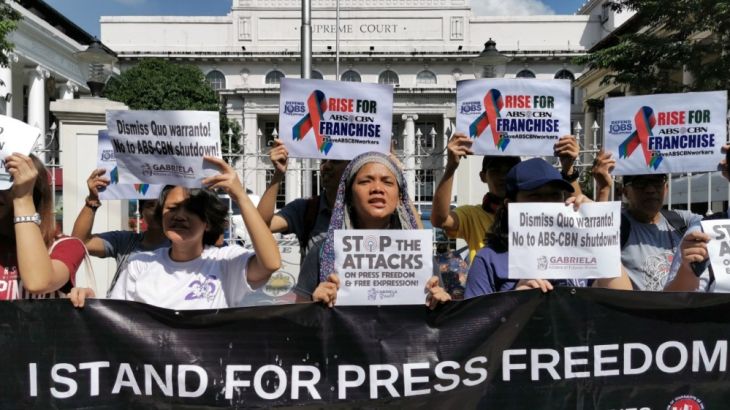Philippines largest TV network ABS-CBN ordered shut
Allies of President Duterte refused to renew station’s 25-year licence following his tirades against the company.

ABS-CBN, the largest television network in the Philippines, has been ordered to cease operations after President Rodrigo Duterte’s allies in Congress refused to renew the station’s 25-year licence.
In an order issued on Tuesday, the government agency tasked with awarding broadcasting licences said “absent a valid Congressional Franchise, as required by law”, the network had to stop its various television and radio operations.
Keep reading
list of 4 itemsPhilippine human rights campaigner granted bail
Families urge Philippines to work with ICC on ‘drug war’ probe
Philippine police officer jailed for killing teens in ‘drug war’
Several bills for the renewal of ABS-CBN’s licence have been pending before Congress since 2019, but Congress sat on the legislation, citing other priorities.
The National Telecommunications Commission (NTC) said ABS-CBN’s license expired on May 4 and gave the station 10 days to respond.
In an interview with ABS-CBN’s radio station, DZMM, NTC Deputy Commissioner Edgardo Cabarios said that the order is “immediately executory”, and Department of Justice Secretary Menardo Guevarra affirmed the legal opinion.
In a statement, which was first read on-air over DZMM, ABS-CBN management said the network would abide by the order and stop operations.
“We did not violate the law. This case appears to be an attempt to deprive Filipinos of the services of ABS-CBN,” the company said in a statement.
|
|
After ABS-CBN files its response within the next 10 days, a hearing will be scheduled as soon as the coronavirus emergency lockdown in Metro Manila and other areas of the country is lifted.
On Sunday, Duterte’s Solicitor-General Jose Calida issued a statement warning the NTC of prosecution if it did not carry out the closure order.
Calida, the top government lawyer, said there was no legal basis to give the company even a provisional licence as it awaited approval from Congress, which resumed its session on Monday after a recess.
Brazen clampdown on the freedom of the press
In a speech at the House of Representatives on Tuesday, Congress member Arlene Brosas denounced the order as a “brazen clampdown of the freedom of the press”.
Danilo Arao, journalism professor at the University of the Philippines, said NTC’s decision reflects the limits of its independence as a government body under the office of the president.
We call on the community of independent Filipino journalists and on all Filipinos who cherish democracy and liberty to stand together and resist this government’s brazen assault on freedom of the press and of expression.
— NUJP (@nujp) May 5, 2020
“This closure order is clearly an attack on press freedom and we should confront this head on. The administration should be exposed as the real enemy of press freedom,” he told Al Jazeera.
With the shutdown, an estimated 11,000 employees of the company risk losing their jobs.
Two ABS-CBN employees, who spoke to Al Jazeera on the condition of anonimity, said they were in tears when the station signed off after the nightly news.
Since becoming president in June 2016, Duterte repeatedly expressed his disdain towards the television network, which is owned by one of the richest families in the Philippines.
Duterte claimed that ABS-CBN refused to run his political advertisements during the campaign season – allegations denied by the network.
ABS-CBN’s coverage of Duterte’s so-called war on drugs, which has killed thousands of people, also angered the Philippine president.
On many occasions, Duterte has threatened to block the renewal of the network’s franchise, while suggesting the owners should sell the company to break the impasse. At the same time, he insisted his hand-picked leaders in Congress were free to decide on the issue.
|
|
Calida, the solicitor-general, maintained that the NTC has no power to issue any such licence to ABS-CBN, citing provisions in the Philippine Constitution which, he said, gave Congress “exclusive powers”.
“Although this legislative power may be delegated to administrative agencies through a law, at present, there is no such law giving the NTC or any other agency the power to grant franchises to broadcasting entities.”
A 2003 Philippine Supreme Court decision also ruled that the NTC could not issue a provisional permit without the legislature’s backing.
In a statement on Tuesday, the National Union of Journalists of the Philippines denounced the “dastardly move” of the Duterte administration.
“All this stems from President Rodrigo Duterte’s personal vendetta against the network, whose franchise renewal he pledged to block.
“It sends a clear message: What Duterte wants, Duterte gets. And it is clear, with this brazen move to shut down ABS-CBN, that he intends to silence the critical media and intimidate everyone else into submission.”
The Foreign Correspondents Association of the Philippines (FOCAP) also issued a statement saying the move “is clearly a case of political harassment against a pillar of the Philippine democracy”.
Meanwhile, the New York-based Committee to Protect Journalists said the Philippine goverment should not let political considerations affect administrative decisions regarding media outlets’ licences.
“Philippine regulators should reverse their closure order against ABS-CBN and allow the news broadcaster to continue operating until its application for a new franchise is decided by Congress,” said Shawn Crispin, CPJ’s senior Southeast Asia representative.